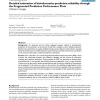Free Online Productivity Tools
i2Speak
i2Symbol
i2OCR
iTex2Img
iWeb2Print
iWeb2Shot
i2Type
iPdf2Split
iPdf2Merge
i2Bopomofo
i2Arabic
i2Style
i2Image
i2PDF
iLatex2Rtf
Sci2ools
BMCBI
2007
2007
Detailed estimation of bioinformatics prediction reliability through the Fragmented Prediction Performance Plots
Background: An important and yet rather neglected question related to bioinformatics predictions is the estimation of the amount of data that is needed to allow reliable predictions. Bioinformatics predictions are usually validated through a series of figures of merit, like for example sensitivity and precision, and little attention is paid to the fact that their performance may depend on the amount of data used to make the predictions themselves. Results: Here I describe a tool, named Fragmented Prediction Performance Plot (FPPP), which monitors the relationship between the prediction reliability and the amount of information underling the prediction themselves. Three examples of FPPPs are presented to illustrate their principal features. In one example, the reliability becomes independent, over a certain threshold, of the amount of data used to predict protein features and the intrinsic reliability of the predictor can be estimated. In the other two cases, on the contrary, the relia...
| Added | 09 Dec 2010 |
| Updated | 09 Dec 2010 |
| Type | Journal |
| Year | 2007 |
| Where | BMCBI |
| Authors | Oliviero Carugo |
Comments (0)

